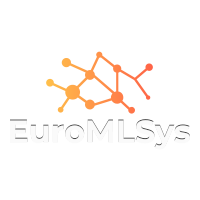The recent wave of research focusing on machine learning and artificial intelligence and its applications has been fuelled by both hardware improvements, ML Compilers and deep learning frameworks that simplify the design, training, inference of neural models. Over the past five years, EuroMLSys was held in conjunction with EuroSys (https://www.euromlsys.eu). The program included topics such as neural model and inference performance optimisation, and compilation for ML workloads. The past workshops were successful, with high quality papers and good size audiences.
This year’s workshop will provide a platform for discussing emerging trends in building frameworks, programming models, optimisation algorithms, and software engineering to support AI/ML applications. At the same time, using ML for building such frameworks or optimisation tools will be discussed. Recent emergence of LLM and agentic systems is remarked by their substantial computational requirements, and optimisation in every possible part of the system will be important. EuroMLSys aims to bridge the gap between AI research and practice, through a technical program of fresh ideas on software infrastructure, tools, design principles, and theory/algorithms, from a systems perspective. We will also explore potential applications that will take advantages of ML.
News
- The workshop website is up!
Key dates
- Paper submission deadline:
February 15, 2026 (23:59 AoE)February 24, 2026 (23:59 AoE) - Acceptance notification:
March 17, 2026March 22, 2026 - Final paper due:
March 30, 2026April 2, 2026 - Workshop: April 27, 2026 (full-day workshop)
Past Editions
Call for Papers
A growing area of interest in machine intelligence is at the intersection of AI/ML and systems design. At the same time, applications of ML are growing in complexity and so is the volume of data they produce/consume. For computer systems to scale, new learning approaches and advanced optimisation techniques are needed. We also need to understand better the current AI/ML frameworks, in terms of their functionality, limitations, and target applications. This will clarify potential desired functions and future architectures. Novel machine learning methods to optimise and accelerate software and hardware systems must also be developed.
EuroMLSys is an interdisciplinary workshop that brings together researchers in computer architecture, systems and machine learning, along with practitioners who are active in these emerging areas.
Topics of interest include, but are not limited to, the following:
- Scheduling algorithms for data processing clusters
- Custom hardware for machine learning
- Hardware-efficient ML methods
- Accelerators/GPU optimisation
- LLM-based hardware design or system optimisation techniques
- Programming languages for machine learning
- Benchmarking systems (for machine learning algorithms)
- Synthetic input data generation for training
- Systems for training and serving machine learning models at scale
- Graph neural networks
- Neural network compression and pruning in systems
- Large scale distributed learning algorithms in practice
- Database systems for large scale learning
- Systems for model-free and model-based Reinforcement Learning
- Optimisation in end-to-end deep learning
- System optimisation using Bayesian Optimisation
- Use of probabilistic models in ML/AI application
- Analysis of distributed ML algorithms
- Probabilistic modelling for distributed ML algorithms
- Synchronisation and state control of distributed ML algorithms
- ML Compiler Optimisation
- Optimisation in Large Language Model (LLM)
- Agentic Systems
Accepted papers will be published in the ACM Digital Library (you can opt out from this).
Submission
Papers must be submitted electronically as PDF files, formatted for 8.5x11-inch paper. Submissions will be up to 6 pages long, including figures, and tables, with 10-point font, in a two-column format. Bibliographic references are not included in the 6-page limit. Submitted papers must use the official SIGPLAN Latex / MS Word templates.
Submissions will be single-blind.
You may include an appendix (there is no page limit). However, it is optional, and we cannot guarantee that the reviewers will read it.
The appendix should be included in the same PDF as the main paper, starting on a new page immediately after the bibliography
Submit your paper at: https://euromlsys26.hotcrp.com/paper/new
Sponsors
Committees
Workshop and TPC Chairs
- Eiko Yoneki, University of Cambridge, https://www.cl.cam.ac.uk/~ey204/
- Paul Patras, University of Edinburgh, http://homepages.inf.ed.ac.uk/ppatras/
Technical Program Committee
- Aaron Zhao, Imperial College London
- Abhishek Dharmaratnakar, Google
- Ahmed Sayed, Queen Mary University of London
- Alec Diallo, University of Edinburgh
- Alexandros Koliousis, Northeastern University London and Institute for Experiential AI
- Amir Payberah, KTH
- Amitabha Roy, Google
- Andy Twigg, Google
- Bo Zhao, Aalto University
- Chi Zhang, Meta
- Christos Bouganis, Imperial College London
- Chunwei Xia, University of Leeds
- Daniel Goodman, Orcle
- Daniel Mendoza, Stanford University
- Dawei Li, Amazon
- Debanshu Das, Google
- Deepak George Thomas, Tulane University
- Dimitris Chatzopoulos, University College Dublin
- Fiodar Kazhamiaka, Microsoft
- Guilherme H. Apostolo, Vrije Universiteit Amsterdam
- Jiayi Nie, University of Cambridge
- Jiwon Seo, Seoul National University
- Joana Tirana, University College Dublin
- Jon Crowcroft, University of Cambridge
- Jose Cano Reyes, University of Glasgow
- Laurent Bindschaedler, MPI
- Luo Mai, University of Edinburgh
- Mengying Zhou, Shanghai University of Finance and Economics
- Nikolas Ioannou, Google
- Pedro Gimenes, Imperial College London
- Pedro Silvestre, Imperial College London
- Peter Pietzuch, Imperial College London
- Peter Triantafillou, University of Warwick
- Pinar Tözün, IT University of Copenhagen
- Pouya Hamadanian, MIT
- Sam Ainsworth, University of Edinburgh
- Sami Alabed, Deepmind
- Smit Hinsu, Google
- Srivaths Ranganathan, Google
- Swapnil Gandhi, Stanford University
- Taiyi Wang, University of Cambridge
- Thaleia Dimitra Doudali, IMDEA
- Tobias Grosser, University of Cambridge
- Valentin Radu, University of Sheffield
- Veljko Pejovic, University of Ljubljana
- Xupeng Miao, Peking University
- Youhe Jiang, University of Cambridge
- Zheng Wang, University of Leeds
- Zhihao Jia, CMU
- Zhiqiang Xie, Stanford University
Web Chair
- Alexis Duque, Net AI
Contact
For any question(s) related to EuroMLSys 2025, please contact the TPC Chairs Eiko Yoneki and Paul Patras.
 Follow us on Twitter: @euromlsys
Follow us on Twitter: @euromlsys


